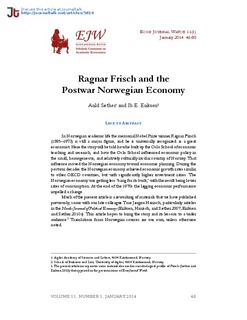Ragnar Frisch and the postwar Norwegian economy
Original version
Sæther, A., & Eriksen, I. E. (2014). Ragnar Frisch and the postwar Norwegian economy. Econ Journal Watch, 11(1), 46-80.Abstract
In the story of Norwegian economics, and of Norwegian economic policy and performance during the postwar years, a central place must be given to Ragnar Frisch (1895-1973). In 1969 he was awarded the first Nobel Prize in economics, together with Jan Tinbergen (1903-1994). In our view, the brighter parts of the story come only in the later years, and they involve the overcoming of Frisch's influence and legacy. As professor, Frisch started a grand project to establish economics as a science based on mathematical models and quantitative analysis, creating what became known as the "Oslo School." This school contributed to the development of a system of economic planning that became close to the centrally planned economies of Eastern Europe. The Norwegian postwar planned economy managed in the first three decades to achieve growth rates on par with the other countries in Western Europe. Growth was achieved, however, partly through investment ratios that were significantly higher than that of other countries; as a consequence, both private and public consumption rates were substantially lower. At the end of the 1970s the inefficiency of the planned economy impelled a change. Reform moved Norway toward a more decentralized market economy, where markets would be governed through a framework of general laws, taxes, and levies. The grand vision of Ragnar Frisch had dissolved.
Description
Published version of an article in the journal: Econ Journal Watch. Also available from the publisher at: http://econjwatch.org/articles/ragnar-frisch-and-the-norwegian-postwar-economy. Open Access
